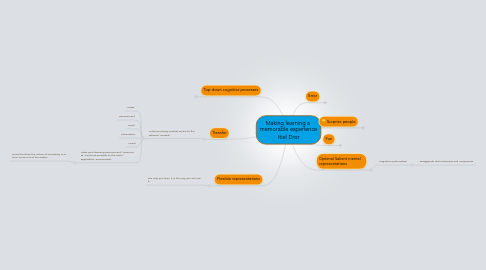
1. Flexible representations
1.1. The way you learn it is the way you will use it.
2. Top-down cognitive processes
2.1. The human mind is not a camera
2.2. Inferential reconstruction
2.2.1. We 'make things up' and 'fill gaps' in.
3. Transfer
3.1. Make encoding context similar to the retrieval context.
3.1.1. Dress
3.1.2. Environment
3.1.3. Smell
3.1.4. Intoxication
3.1.5. Mood
3.1.6. Make your learning environment / resource as similar as possible to the work / application environment
3.1.6.1. Does this blow the notion of accessing LMS from home out of the water?
4. Surprise people
4.1. Attract ATTENTION!
4.1.1. Make salient long lasting memories
4.1.2. Encode the info in episodic memory
4.1.3. Ue by 'experiential' decision making / behaviour able system
5. Fun
5.1. Use games to get your learning point across
6. Optimal Salient mental representations
6.1. Cognitive optimisation
6.1.1. Exaggerate distinctiveness and Uniqueness
7. Error
7.1. Most activities in education sector does not result in the leaner remembering anything.
7.1.1. New Node
7.1.2. It's not just about learning, it's about being able to transfer, apply and synthesise
7.2. The human brain
7.2.1. TMI in many learning resources
7.2.1.1. This leads to cognitive overload
7.2.1.1.1. Q. How many F's?
7.3. Do we always want people to remember what we tell them?
7.3.1. Think of getting a song stuck in your head? Really?
7.3.2. How rare is it?
7.3.3. How important is it?
7.4. Why do you remember past experiences?
7.4.1. Emotions
7.4.1.1. Negative emotions are very powerful
7.4.1.2. The cognitive power of error!
7.4.1.2.1. Create a learning experience that forces the learner to make a mistake EARLY! This will create a strong and motivating emotion.
7.4.1.2.2. Creating 'too strong' a memorable experience can lead to people going straight to that option, even if its not the correct process.
7.4.1.2.3. Consider allowing the learners to spot mistakes in others, This is 'less' of an emotional experience
